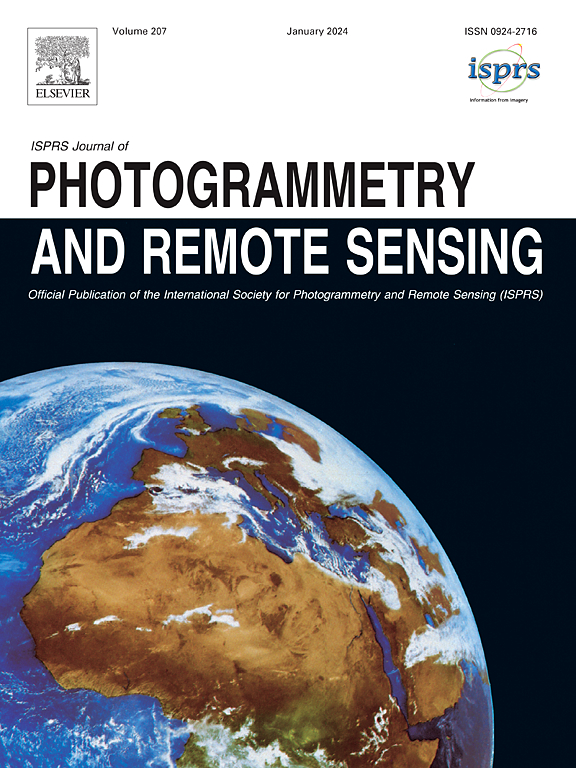Fast and accurate SAR geocoding with a plane approximation
IF 10.6
1区 地球科学
Q1 GEOGRAPHY, PHYSICAL
ISPRS Journal of Photogrammetry and Remote Sensing
Pub Date : 2024-11-11
DOI:10.1016/j.isprsjprs.2024.10.031
引用次数: 0
Abstract
Geocoding is the procedure of finding the mapping between the Synthetic Aperture Radar (SAR) image and the imaged scene. The inverse form of the Range-Doppler (RD) model has been adopted to approximate the geocoding results. However, with advances in SAR imaging geodesy, its imprecise nature becomes more perceptible. The forward RD model gives reliable solutions but is time-consuming and unable to detect geometric distortions. This study proposes a highly optimized forward geocoding method to find the precise ground position of each image sample with a Digital Elevation Model (DEM). By following the intersection of the terrain and the so-called solution surface of an azimuth line, which can be locally approximated by a plane, it produces geo-location results almost identical to the analytical solutions of the RD model. At the same time, the non-unique geocoding solutions and the geometric distortions are determined. Deviations from the employed approximations are assessed, showing that they are highly predictable and lead to negligible range/azimuth residuals. The general robustness is verified by experiments on SAR images of different resolutions covering diversified terrains in the native or zero Doppler geometry. Comparisons with other forward algorithms demonstrate that, with extra geometric distortions detection ability, its accuracy and efficiency are comparable to them. For a Sentinel-1 IW burst of high topographic relief, the algorithm ends in a 3 s using 16 parallel cores, with an average residual smaller than one millimeter. Its impressive blend of efficiency, accuracy, and geometric distortion detection capabilities makes it ideal for large-scale remote sensing applications.
利用平面近似进行快速准确的合成孔径雷达地理编码
地理编码是找到合成孔径雷达(SAR)图像与成像场景之间映射关系的过程。测距-多普勒(RD)模型的反形式被用来近似地理编码结果。然而,随着合成孔径雷达成像大地测量技术的发展,其不精确性变得越来越明显。前向 RD 模型能给出可靠的解,但耗时长,且无法检测几何变形。本研究提出了一种高度优化的前向大地编码方法,利用数字高程模型(DEM)找到每个图像样本的精确地面位置。通过跟踪地形与方位角线的所谓解面(可局部近似为平面)的交点,该方法得出的地理定位结果与 RD 模型的解析解几乎完全一致。同时,还确定了非唯一地理编码解和几何变形。对所采用近似值的偏差进行了评估,结果表明这些偏差具有很高的可预测性,导致的测距/方位角残差可以忽略不计。通过对不同分辨率的合成孔径雷达图像进行实验,验证了在原生或零多普勒几何条件下覆盖不同地形的总体稳健性。与其他前向算法的比较表明,该算法具有额外的几何畸变检测能力,其精度和效率与其他算法不相上下。对于地形起伏较大的哨兵-1 IW 阵列,该算法使用 16 个并行内核在 3 秒内完成,平均残差小于 1 毫米。该算法在效率、准确性和几何畸变检测能力方面的出色表现使其成为大规模遥感应用的理想选择。
本文章由计算机程序翻译,如有差异,请以英文原文为准。
求助全文
约1分钟内获得全文
求助全文
来源期刊

ISPRS Journal of Photogrammetry and Remote Sensing
工程技术-成像科学与照相技术
CiteScore
21.00
自引率
6.30%
发文量
273
审稿时长
40 days
期刊介绍:
The ISPRS Journal of Photogrammetry and Remote Sensing (P&RS) serves as the official journal of the International Society for Photogrammetry and Remote Sensing (ISPRS). It acts as a platform for scientists and professionals worldwide who are involved in various disciplines that utilize photogrammetry, remote sensing, spatial information systems, computer vision, and related fields. The journal aims to facilitate communication and dissemination of advancements in these disciplines, while also acting as a comprehensive source of reference and archive.
P&RS endeavors to publish high-quality, peer-reviewed research papers that are preferably original and have not been published before. These papers can cover scientific/research, technological development, or application/practical aspects. Additionally, the journal welcomes papers that are based on presentations from ISPRS meetings, as long as they are considered significant contributions to the aforementioned fields.
In particular, P&RS encourages the submission of papers that are of broad scientific interest, showcase innovative applications (especially in emerging fields), have an interdisciplinary focus, discuss topics that have received limited attention in P&RS or related journals, or explore new directions in scientific or professional realms. It is preferred that theoretical papers include practical applications, while papers focusing on systems and applications should include a theoretical background.
 求助内容:
求助内容: 应助结果提醒方式:
应助结果提醒方式:


